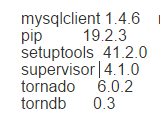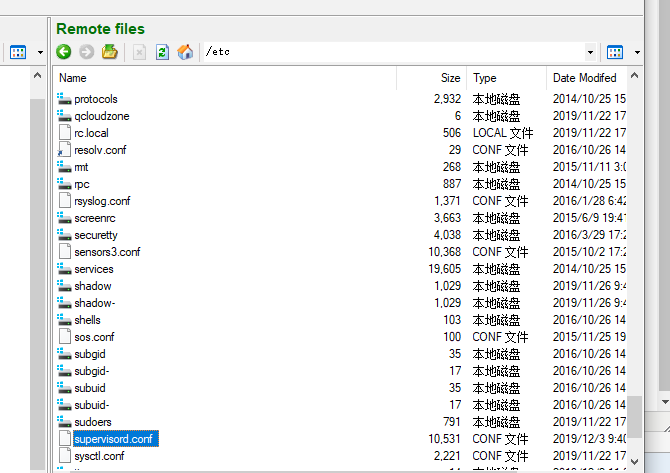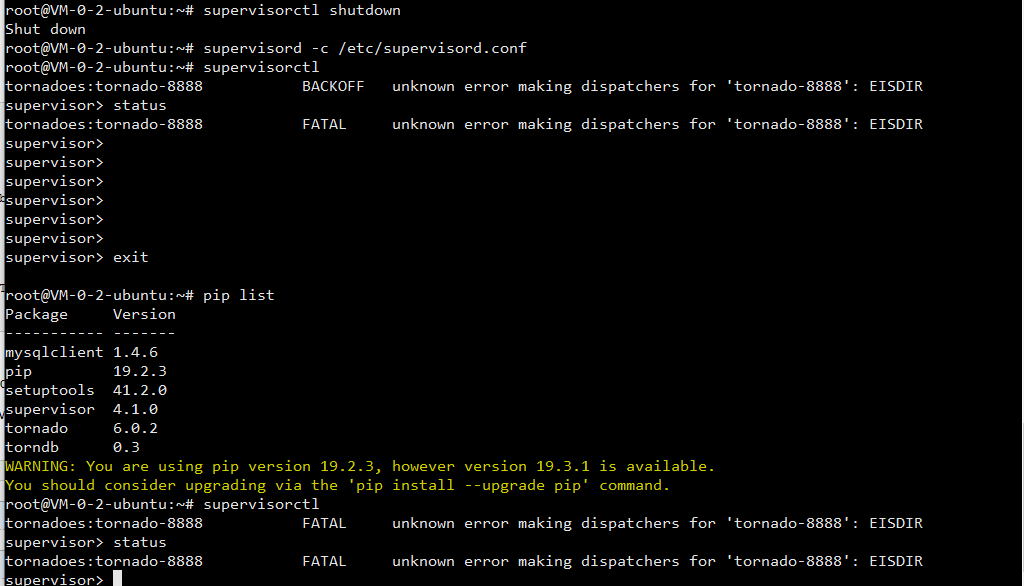Environmental Science:
1. Ubuntu server
2,python3.7.5
install
1,python3.7.5
The installation is relatively simple, and the process is roughly
. / configure - > make & & make install - > create python soft connection pip soft connection
It's easy to install. Only when the installation is completed and running can we encounter all kinds of problems, such as lack of plug-ins.
1.1. Download package python3.7.5
1.2 problems
a,No module named '_ctypes'
Sudo apt get install libffi dev needs to be reinstalled
b,No module named _ssl
Before installation, modify the contents of the setup.dist file in modules in the installation package
ex: my installation directory / usr/web/tornadoTest/package/Python-3.7.5/Modules/Setup.dist
About 206 lines, just remove the comment

Then re install, wait for pip these can be used in the next step.
2. package required for installation
The package you need is mysqldb tornado torndb. It depends on whether you use pymysql or mysqldb

2.1 pip install
2.2 mysqldb installation
You need to configure MySQL config before installing MySQL dB
sudo apt-get install libmysqlclient-dev
sudo apt-get install python-dev

And then install.
3. Startup error
3.1 torndb error
if MySQLdb is not None:
# Fix the access conversions to properly recognize unicode/binary
FIELD_TYPE = MySQLdb.constants.FIELD_TYPE
FLAG = MySQLdb.constants.FLAG
CONVERSIONS = copy.copy(MySQLdb.converters.conversions)
field_types = [FIELD_TYPE.BLOB, FIELD_TYPE.STRING, FIELD_TYPE.VAR_STRING]
if 'VARCHAR' in vars(FIELD_TYPE):
field_types.append(FIELD_TYPE.VARCHAR)
#for field_type in field_types:
# CONVERSIONS[field_type] = [(FLAG.BINARY, str)] + CONVERSIONS[field_type]
Comment this out
3.2. This error may also occur when the query data is started successfully.

https://www.cnblogs.com/simplezhuo/p/9811369.html
4. nginx configuration
4.1. tornado service can run
python server.py --port 8888
The logout of nohup python server.py will not stop.
4.2 configuration

default.conf
## # You should look at the following URL's in order to grasp a solid understanding # of Nginx configuration files in order to fully unleash the power of Nginx. # http://wiki.nginx.org/Pitfalls # http://wiki.nginx.org/QuickStart # http://wiki.nginx.org/Configuration # # Generally, you will want to move this file somewhere, and start with a clean # file but keep this around for reference. Or just disable in sites-enabled. # # Please see /usr/share/doc/nginx-doc/examples/ for more detailed examples. ## # Default server configuration # upstream tornados{ server 127.0.0.1:8888; } proxy_next_upstream error; server { listen 80 default_server; listen [::]:80 default_server; # SSL configuration # # listen 443 ssl default_server; # listen [::]:443 ssl default_server; # # Note: You should disable gzip for SSL traffic. # See: https://bugs.debian.org/773332 # # Read up on ssl_ciphers to ensure a secure configuration. # See: https://bugs.debian.org/765782 # # Self signed certs generated by the ssl-cert package # Don't use them in a production server! # # include snippets/snakeoil.conf; # Add index.php to the list if you are using PHP
index index.html index.htm index.nginx-debian.html; server_name 111.231.201.164; location /cnc/1/ { alias /usr/web/cnc/; index index.html index.htm; } location /cnc/2/ { alias /usr/web/cnc/; index index.html index.htm; } location /cnc/3 { alias /usr/web/cnc/; index index.html index.htm; } location /cnc/4 { alias /usr/web/cnc/; index index.html index.htm; } location /cnc/5 { alias /usr/web/cnc/; index index.html index.htm; } location /cnc/6 { alias /usr/web/cnc/; index index.html index.htm; } location /cnc/7 { alias /usr/web/cnc/; index index.html index.htm; } location /api/{ allow 111.231.201.164; proxy_pass_header Server; proxy_set_header Host $http_host; proxy_redirect off; proxy_set_header X-Real-IP $remote_addr; proxy_set_header X-Forwarded-For $proxy_add_x_forwarded_for; proxy_set_header X-Scheme $scheme; proxy_pass http://127.0.0.1:8888/; } # pass the PHP scripts to FastCGI server listening on 127.0.0.1:9000 # #location ~ \.php$ { # include snippets/fastcgi-php.conf; # # # With php7.0-cgi alone: # fastcgi_pass 127.0.0.1:9000; # # With php7.0-fpm: # fastcgi_pass unix:/run/php/php7.0-fpm.sock; #} # deny access to .htaccess files, if Apache's document root # concurs with nginx's one # #location ~ /\.ht { # deny all; #} } # Virtual Host configuration for example.com # # You can move that to a different file under sites-available/ and symlink that # to sites-enabled/ to enable it. # #server { # listen 80; # listen [::]:80; # # server_name example.com; # # root /var/www/example.com; # index index.html; # # location / { # try_files $uri $uri/ =404; # } #}
Now I mount tornado's service 127.0.0.1:8888 on port 80 + api /
Original access: http://111.231.201.164:8888/houses
Now: http://111.231.201.164/api/houses
5. supervisor configuration
5.1 installation of supervisor
sudo apt-get install supervisor
Create profile
echo_supervisord_conf > /etc/supervisord.conf

; Sample supervisor config file.
;
; For more information on the config file, please see:
; http://supervisord.org/configuration.html
;
; Notes:
; - Shell expansion ("~" or "$HOME") is not supported. Environment
; variables can be expanded using this syntax: "%(ENV_HOME)s".
; - Quotes around values are not supported, except in the case of
; the environment= options as shown below.
; - Comments must have a leading space: "a=b ;comment" not "a=b;comment".
; - Command will be truncated if it looks like a config file comment, e.g.
; "command=bash -c 'foo ; bar'" will truncate to "command=bash -c 'foo ".
;
; Warning:
; Paths throughout this example file use /tmp because it is available on most
; systems. You will likely need to change these to locations more appropriate
; for your system. Some systems periodically delete older files in /tmp.
; Notably, if the socket file defined in the [unix_http_server] section below
; is deleted, supervisorctl will be unable to connect to supervisord.
[unix_http_server]
file=/tmp/supervisor.sock ; the path to the socket file
;chmod=0700 ; socket file mode (default 0700)
;chown=nobody:nogroup ; socket file uid:gid owner
;username=user ; default is no username (open server)
;password=123 ; default is no password (open server)
; Security Warning:
; The inet HTTP server is not enabled by default. The inet HTTP server is
; enabled by uncommenting the [inet_http_server] section below. The inet
; HTTP server is intended for use within a trusted environment only. It
; should only be bound to localhost or only accessible from within an
; isolated, trusted network. The inet HTTP server does not support any
; form of encryption. The inet HTTP server does not use authentication
; by default (see the username= and password= options to add authentication).
; Never expose the inet HTTP server to the public internet.
;[inet_http_server] ; inet (TCP) server disabled by default
;port=127.0.0.1:9001 ; ip_address:port specifier, *:port for all iface
;username=user ; default is no username (open server)
;password=123 ; default is no password (open server)
[supervisord]
logfile=/tmp/supervisord.log ; main log file; default $CWD/supervisord.log
logfile_maxbytes=50MB ; max main logfile bytes b4 rotation; default 50MB
logfile_backups=10 ; # of main logfile backups; 0 means none, default 10
loglevel=info ; log level; default info; others: debug,warn,trace
pidfile=/tmp/supervisord.pid ; supervisord pidfile; default supervisord.pid
nodaemon=false ; start in foreground if true; default false
minfds=1024 ; min. avail startup file descriptors; default 1024
minprocs=200 ; min. avail process descriptors;default 200
;umask=022 ; process file creation umask; default 022
;user=supervisord ; setuid to this UNIX account at startup; recommended if root
;identifier=supervisor ; supervisord identifier, default is 'supervisor'
;directory=/tmp ; default is not to cd during start
;nocleanup=true ; don't clean up tempfiles at start; default false
;childlogdir=/tmp ; 'AUTO' child log dir, default $TEMP
;environment=KEY="value" ; key value pairs to add to environment
;strip_ansi=false ; strip ansi escape codes in logs; def. false
; The rpcinterface:supervisor section must remain in the config file for
; RPC (supervisorctl/web interface) to work. Additional interfaces may be
; added by defining them in separate [rpcinterface:x] sections.
[rpcinterface:supervisor]
supervisor.rpcinterface_factory = supervisor.rpcinterface:make_main_rpcinterface
; The supervisorctl section configures how supervisorctl will connect to
; supervisord. configure it match the settings in either the unix_http_server
; or inet_http_server section.
[supervisorctl]
serverurl=unix:///tmp/supervisor.sock ; use a unix:// URL for a unix socket
;serverurl=http://127.0.0.1:9001 ; use an http:// url to specify an inet socket
;username=chris ; should be same as in [*_http_server] if set
;password=123 ; should be same as in [*_http_server] if set
;prompt=mysupervisor ; cmd line prompt (default "supervisor")
;history_file=~/.sc_history ; use readline history if available
; The sample program section below shows all possible program subsection values.
; Create one or more 'real' program: sections to be able to control them under
; supervisor.
;[program:theprogramname]
;command=/bin/cat ; the program (relative uses PATH, can take args)
;process_name=%(program_name)s ; process_name expr (default %(program_name)s)
;numprocs=1 ; number of processes copies to start (def 1)
;directory=/tmp ; directory to cwd to before exec (def no cwd)
;umask=022 ; umask for process (default None)
;priority=999 ; the relative start priority (default 999)
;autostart=true ; start at supervisord start (default: true)
;startsecs=1 ; # of secs prog must stay up to be running (def. 1)
;startretries=3 ; max # of serial start failures when starting (default 3)
;autorestart=unexpected ; when to restart if exited after running (def: unexpected)
;exitcodes=0 ; 'expected' exit codes used with autorestart (default 0)
;stopsignal=QUIT ; signal used to kill process (default TERM)
;stopwaitsecs=10 ; max num secs to wait b4 SIGKILL (default 10)
;stopasgroup=false ; send stop signal to the UNIX process group (default false)
;killasgroup=false ; SIGKILL the UNIX process group (def false)
;user=chrism ; setuid to this UNIX account to run the program
;redirect_stderr=true ; redirect proc stderr to stdout (default false)
;stdout_logfile=/a/path ; stdout log path, NONE for none; default AUTO
;stdout_logfile_maxbytes=1MB ; max # logfile bytes b4 rotation (default 50MB)
;stdout_logfile_backups=10 ; # of stdout logfile backups (0 means none, default 10)
;stdout_capture_maxbytes=1MB ; number of bytes in 'capturemode' (default 0)
;stdout_events_enabled=false ; emit events on stdout writes (default false)
;stdout_syslog=false ; send stdout to syslog with process name (default false)
;stderr_logfile=/a/path ; stderr log path, NONE for none; default AUTO
;stderr_logfile_maxbytes=1MB ; max # logfile bytes b4 rotation (default 50MB)
;stderr_logfile_backups=10 ; # of stderr logfile backups (0 means none, default 10)
;stderr_capture_maxbytes=1MB ; number of bytes in 'capturemode' (default 0)
;stderr_events_enabled=false ; emit events on stderr writes (default false)
;stderr_syslog=false ; send stderr to syslog with process name (default false)
;environment=A="1",B="2" ; process environment additions (def no adds)
;serverurl=AUTO ; override serverurl computation (childutils)
; The sample eventlistener section below shows all possible eventlistener
; subsection values. Create one or more 'real' eventlistener: sections to be
; able to handle event notifications sent by supervisord.
;[eventlistener:theeventlistenername]
;command=/bin/eventlistener ; the program (relative uses PATH, can take args)
;process_name=%(program_name)s ; process_name expr (default %(program_name)s)
;numprocs=1 ; number of processes copies to start (def 1)
;events=EVENT ; event notif. types to subscribe to (req'd)
;buffer_size=10 ; event buffer queue size (default 10)
;directory=/tmp ; directory to cwd to before exec (def no cwd)
;umask=022 ; umask for process (default None)
;priority=-1 ; the relative start priority (default -1)
;autostart=true ; start at supervisord start (default: true)
;startsecs=1 ; # of secs prog must stay up to be running (def. 1)
;startretries=3 ; max # of serial start failures when starting (default 3)
;autorestart=unexpected ; autorestart if exited after running (def: unexpected)
;exitcodes=0 ; 'expected' exit codes used with autorestart (default 0)
;stopsignal=QUIT ; signal used to kill process (default TERM)
;stopwaitsecs=10 ; max num secs to wait b4 SIGKILL (default 10)
;stopasgroup=false ; send stop signal to the UNIX process group (default false)
;killasgroup=false ; SIGKILL the UNIX process group (def false)
;user=chrism ; setuid to this UNIX account to run the program
;redirect_stderr=false ; redirect_stderr=true is not allowed for eventlisteners
;stdout_logfile=/a/path ; stdout log path, NONE for none; default AUTO
;stdout_logfile_maxbytes=1MB ; max # logfile bytes b4 rotation (default 50MB)
;stdout_logfile_backups=10 ; # of stdout logfile backups (0 means none, default 10)
;stdout_events_enabled=false ; emit events on stdout writes (default false)
;stdout_syslog=false ; send stdout to syslog with process name (default false)
;stderr_logfile=/a/path ; stderr log path, NONE for none; default AUTO
;stderr_logfile_maxbytes=1MB ; max # logfile bytes b4 rotation (default 50MB)
;stderr_logfile_backups=10 ; # of stderr logfile backups (0 means none, default 10)
;stderr_events_enabled=false ; emit events on stderr writes (default false)
;stderr_syslog=false ; send stderr to syslog with process name (default false)
;environment=A="1",B="2" ; process environment additions
;serverurl=AUTO ; override serverurl computation (childutils)
; The sample group section below shows all possible group values. Create one
; or more 'real' group: sections to create "heterogeneous" process groups.
;[group:thegroupname]
;programs=progname1,progname2 ; each refers to 'x' in [program:x] definitions
;priority=999 ; the relative start priority (default 999)
; The [include] section can just contain the "files" setting. This
; setting can list multiple files (separated by whitespace or
; newlines). It can also contain wildcards. The filenames are
; interpreted as relative to this file. Included files *cannot*
; include files themselves.
[include]
files = /etc/supervisor/*.conf
Create another profile

tornado.conf
[group:tornadoes] programs=tornado-8888 [program:tornado-8888] command=/usr/bin/python /usr/web/tornadoTest/server.py --port=8888 ##python tornado starts py directory=/usr/web/tornadoTest user=root autorestart=true redirect_stderr=true stdout_logfile=/usr/web/tornadoTest/logs loglevel=info
5.2 boot
Start Supervisor - C / etc / supervisor.conf to specify the configuration file
supervisor shutdown

So far.
Code of api attached
server.py
#!/usr/bin/env python # -*- coding:utf-8 -*- import tornado.ioloop from src.urls import * # Introduce urls import torndb import conf.db as dbSettings import os class Application(tornado.web.Application): def __init__(self): handlers = [ # (r"/", MainHandler), # (r"/story/(sishen[0-9]+)", StoryHandler), # Regular url mapping, easy to get (r"/houses/([0-9]+)", HouseHandler), (r"/houses", HouseHandler), ] settings = dict( template_path=os.path.join(os.path.dirname(__file__), "templates"), static_path=os.path.join(os.path.dirname(__file__), "statics"), debug=True, ) super(Application, self).__init__(handlers, **settings) # Get database configuration information dbInfo = dbSettings.default # Create a global mysql Connect instances for handler Use self.db = torndb.Connection(host=dbInfo['host'], user=dbInfo['user'], password=dbInfo['password'], database=dbInfo['dbName'], charset='utf8') if __name__ == "__main__": application = Application() application.listen(8888) tornado.ioloop.IOLoop.instance().start()
urls.py
import tornado.web import json from conf.log import decoratore # Import log decorator from conf.fun import * class BaseHandler(tornado.web.RequestHandler): # blog.csdn.net/moshowgame Solve cross domain problems def set_default_headers(self): self.set_header("Access-Control-Allow-Origin", "*") # This place can write domain name self.set_header("Access-Control-Allow-Headers", "x-requested-with, Authorization") self.set_header('Access-Control-Allow-Methods', 'POST, GET, OPTIONS') self.set_header('Access-Control-Allow-Credentials', 'true') # def write(self, chunk): # self.set_header('Access-Control-Allow-Origin', 'http://localhost:4200') # self.set_header('Access-Control-Allow-Headers', 'Origin, X-Requested-With, Content-Type, Accept, x-token, X-File-Upload') # self.set_header('Access-Control-Allow-Methods', 'POST, GET, PUT, OPTIONS, DELETE') # self.set_header('Access-Control-Allow-Credentials', 'true') # super(BaseHandler, self).write(chunk) class MainHandler(BaseHandler): @decoratore def get(self): self.write("Hello, World") # Visit: http://localhost:8888/story/sishen232 # display:U get story id is sishen232 class HouseHandler(BaseHandler): '''house class''' def __init__(self, application, request): '''Required parameters''' super().__init__(application, request) # Preprocessing self.data = ByteData(self.request.arguments) self.params = ['title', 'position', 'size', 'address'] @decoratore def post(self): '''Submission House Interface''' # # Judge whether the submitted parameters are wrong # if(('title' not in raw_data) or ('position' not in raw_data)): # self.write(json.dumps( # {"false": {"msg": 'Parameter error'}}, ensure_ascii=False)) # return code = paramsCheck(self.data, self.params) if code == 1: raw_data = self.data if('year' not in raw_data): raw_data['year'] = '' print(raw_data) data = self.application.db.execute( "insert into house(title, position, size, address, year) values('{}', '{}', {}, '{}', '{}')".format(raw_data['title'], raw_data['position'], float(raw_data['size']), raw_data['address'], raw_data['year'])) # self.write(json.dumps({"sum": s})) self.write(json.dumps( {"success": {"msg": 'Add success'}}, ensure_ascii=False)) else: self.write(json.dumps( {"false": {"msg": 'Parameter error'}}, ensure_ascii=False)) def get(self, House_id=''): ''' # Get the House interface # If the house ID exists, get the data. If it does not exist, get all the data ''' sql = 'select * from house' if House_id == '' else 'select * from house where id = {id}'.format( id=House_id) data = self.application.db.query(sql) # self.write(json.dumps({"sum": s})) self.write(json.dumps( {"success": {"msg": 'Get success', "data": data}}, ensure_ascii=False))
Log decorator and some general functions can be removed.